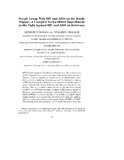People living with HIV and AIDS on the brink: stigma - a complex sociocultural impediment in the fight against HIV and AIDS in Botswana

View/
Date
2009Author
Nthomang, K.
Phaladze, N.
Oagile, N.
Ngwenya, B.
Seboni, N.
Gobotswang, K.
Kubanji, R.
Publisher
Taylor & Francis, http://www.informaworld.com/smpp/title~db=all~content=t713723020Type
Published ArticleMetadata
Show full item recordAbstract
HIV-related stigma is a life-altering phenomenon. The consequence of the stigmatization process sets apart stigmatized person(s) as a distinct category, leading to various forms of disapproval, rejection, exclusion, labeling, stereotyping, and discrimination. Stigma of HIV-positive people in Botswana is a complex social phenomenon associated with the disease itself and the behaviors that lead to infection. This is a synthesis paper based on the literature review on HIV- and AIDS-related stigmatization of HIV-positive people in Botswana and in-depth interviews with people living with HIV and AIDS (PLWHAs). I examine the literature on HIV- and AIDS-related stigmatization and subsequent discrimination and the implications for intervention programs for people living with HIV and AIDS. The findings from the literature and in-depth interviews show that HIV-AIDS-related stigma is deeply embedded in societal structures and culture which promote nonacceptance of those branded HIV positive. This often is reinforced at a practical level by pervasive negative attitudes toward PLWHAs. Recommendations argue for the adoption of Healthy Relationship. This intervention seeks to promote and strengthen decision-making skills among PLWHAs and programs that promote destigmatization of, and tolerant attitudes toward, PLWHAs.
